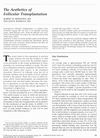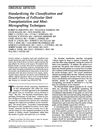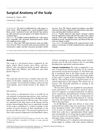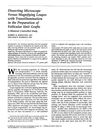 149 citations,
July 2002 in “Dermatologic clinics”
149 citations,
July 2002 in “Dermatologic clinics” Patients with certain skin symptoms and high ANA titers should be monitored for potential systemic lupus.
 112 citations,
July 2008 in “Dermatologic Therapy”
112 citations,
July 2008 in “Dermatologic Therapy” Folliculitis decalvans is a rare scalp condition causing scarring hair loss, treated with long-term antibiotics and other medications, but it often comes back and is hard to manage.
 89 citations,
October 1996 in “Dermatologic Clinics”
89 citations,
October 1996 in “Dermatologic Clinics” Alopecia areata is likely caused by a combination of genetic factors and immune system dysfunction, and may represent different diseases with various causes.
 87 citations,
September 2016 in “Dermatologic Surgery”
87 citations,
September 2016 in “Dermatologic Surgery” PRP shows potential for treating female hair loss, but more research needed.
 79 citations,
March 2017 in “Dermatologic clinics”
79 citations,
March 2017 in “Dermatologic clinics” Vitiligo affects overall health and self-esteem, needing more research and awareness.
 77 citations,
July 2007 in “Dermatologic Therapy”
77 citations,
July 2007 in “Dermatologic Therapy” Methotrexate is a key, cost-effective drug for skin conditions, but requires careful monitoring for side effects.
 70 citations,
February 2017 in “Dermatologic Surgery”
70 citations,
February 2017 in “Dermatologic Surgery” Treatment with plasma rich in growth factors improved hair density and thickness for hair loss patients.
 67 citations,
September 2008 in “Dermatologic therapy”
67 citations,
September 2008 in “Dermatologic therapy” Hirsutism is excessive hair growth in women often caused by polycystic ovarian syndrome, and identifying the cause is important for managing associated health risks.
 67 citations,
September 1997 in “Dermatologic Surgery”
67 citations,
September 1997 in “Dermatologic Surgery” The document concludes that good cosmetic outcomes in hair transplantation depend on the surgeon's artistic skill and careful planning.
 66 citations,
September 2008 in “Dermatologic therapy”
66 citations,
September 2008 in “Dermatologic therapy” The conclusion is that the best initial treatment for hirsutism is usually oral contraceptives, with the addition of antiandrogens or insulin sensitizers if needed, and topical eflornithine or laser treatments as supplementary options.
 64 citations,
July 2011 in “Dermatologic Therapy”
64 citations,
July 2011 in “Dermatologic Therapy” Scalp cooling can prevent chemotherapy-induced hair loss, and certain treatments can speed up hair regrowth, but more research is needed for better treatments.
 58 citations,
October 2001 in “Dermatologic Clinics”
58 citations,
October 2001 in “Dermatologic Clinics” Hair loss can indicate underlying systemic diseases and addressing these can sometimes reverse the hair loss.
 55 citations,
July 2016 in “Dermatologic Therapy”
55 citations,
July 2016 in “Dermatologic Therapy” Multiple treatments work best for hair loss.
 55 citations,
July 2013 in “Dermatologic therapy”
55 citations,
July 2013 in “Dermatologic therapy” Some dermatological medications can impair male fertility, so consult a doctor before trying to conceive.
 55 citations,
October 2003 in “Dermatologic Clinics”
55 citations,
October 2003 in “Dermatologic Clinics” Different hair care practices and conditions affect African American hair and scalp health, requiring specialized knowledge for treatment.
 54 citations,
September 2012 in “Dermatologic Clinics”
54 citations,
September 2012 in “Dermatologic Clinics” Some medications can cause hair loss, but stopping the drug usually leads to recovery within 3 months.
 51 citations,
July 2008 in “Dermatologic Therapy”
51 citations,
July 2008 in “Dermatologic Therapy” The document concludes that surgery is a preferred treatment for cicatricial alopecia, with the method chosen based on individual factors and may require multiple sessions and careful postoperative care.
 49 citations,
August 2007 in “Dermatologic surgery”
49 citations,
August 2007 in “Dermatologic surgery” New treatments for acne scars are safer and more effective because we understand the causes better.
 34 citations,
August 2005 in “Dermatologic Clinics”
34 citations,
August 2005 in “Dermatologic Clinics” Stress and emotional factors can worsen skin conditions by affecting the immune system.
 33 citations,
September 2008 in “Dermatologic therapy”
33 citations,
September 2008 in “Dermatologic therapy” Doctors should know how to diagnose and treat PCOS, which often involves checking for high male hormone levels and using medications to manage symptoms.
 33 citations,
September 1998 in “Dermatologic Surgery”
33 citations,
September 1998 in “Dermatologic Surgery” Surgeons suggested a standard system for hair transplant methods to improve communication and results.
 31 citations,
November 2013 in “Dermatologic Clinics”
31 citations,
November 2013 in “Dermatologic Clinics” The ARTAS robotic system for hair restoration is efficient with fewer cuts than manual methods, but it's limited to certain hair types and can still leave scars.
 31 citations,
April 1999 in “Dermatologic Clinics”
31 citations,
April 1999 in “Dermatologic Clinics” Nd:YAG laser can reduce hair with multiple treatments, but permanent removal isn't guaranteed.
 30 citations,
April 2007 in “Dermatologic Clinics”
30 citations,
April 2007 in “Dermatologic Clinics” The document concludes that new treatments are needed to better manage acne and reduce side effects related to current therapies.
 30 citations,
January 2000 in “Dermatologic Clinics”
30 citations,
January 2000 in “Dermatologic Clinics” Finasteride and minoxidil are effective FDA-approved treatments for androgenetic alopecia.
 29 citations,
September 2012 in “Dermatologic Clinics”
29 citations,
September 2012 in “Dermatologic Clinics” Hair disorders are caused by a complex mix of biology, genetics, hormones, and environmental factors, affecting hair growth and leading to conditions like alopecia.
 29 citations,
March 2008 in “Dermatologic Surgery”
29 citations,
March 2008 in “Dermatologic Surgery” The Cross-section Trichometer is a new tool that can measure hair quantity and detect hair loss and growth.
 28 citations,
July 2002 in “Dermatologic Surgery”
28 citations,
July 2002 in “Dermatologic Surgery” Understanding scalp anatomy is crucial for successful and safe scalp surgery.
 26 citations,
October 2012 in “Dermatologic Clinics”
26 citations,
October 2012 in “Dermatologic Clinics” The document details hair transplantation techniques and innovations, highlighting Follicular Unit Transplantation as the standard and discussing the effectiveness and challenges of the procedure.
 25 citations,
August 1998 in “Dermatologic Surgery”
25 citations,
August 1998 in “Dermatologic Surgery” Dissecting microscopes give more and better quality hair grafts than magnifying loupes.






























